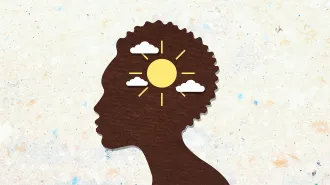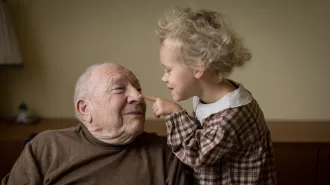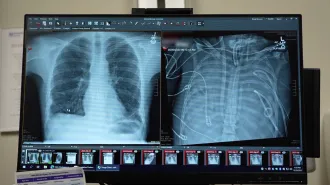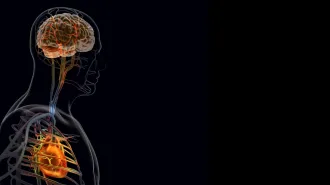Friend or foe? Drunk, the brain can’t tell
Scans show that when sobriety goes so does the ability to make key assessments
- More than 2 years ago
When the brain wears beer goggles it can’t see the difference between scary or threatening situations and safe ones.
Researchers at the National Institute on Alcohol Abuse and Alcoholism in Bethesda, Md., used fMRI scanners to peer into the brains of a dozen intoxicated volunteers and find out how alcohol eases inhibitions and prompts often unwise behavior.
When people drink, neural circuits in the visual system and parts of the brain involved in assessing threats are not as active as they are when people are sober, the team discovered. The brain’s reward system, however, becomes more active under the influence. That combination could lower anxiety and allow intoxicated people to approach others at a party more readily, but the mix also makes the inebriated more likely to take rash actions or stumble into sticky situations.
“If you are not processing the fact that there’s a threat, you might be less cautious,” says Jodi Gilman, one of the researchers. The team reports the findings in the April 30 Journal of Neuroscience.
Gilman and her colleagues gave a dozen social drinkers — seven women and five men — either alcohol or a placebo through an IV. The participants reported feeling increasingly tipsy as their blood alcohol climbed to 0.08 percent, a level considered legally drunk in most places. Volunteers caught on pretty quickly to the placebo, Gilman says.
While in the fMRI scanner, volunteers saw pictures of faces. Some of the faces had neutral expressions while others showed fear. When sober, fearful faces sparked activity in parts of the brain involved in object recognition as well as in the amygdala, insula and parahippocampal gyrus — all involved in processing emotion. Neutral faces didn’t increase activity in those parts of the brain in sober people.
After the intravenous equivalent of a few drinks, the volunteers’ emotion-processing areas and object-recognition centers no longer responded to fearful faces. Yet the ventral striatum, part of the reward system of the brain, lit up with the infusion of alcohol. Drugs that dampen the response of the ventral striatum could take away the pleasure of drinking and lead problem drinkers to curb their alcohol consumption, Gilman says.
“You know from observing people’s behavior that they do stupid things when they’ve had a few drinks,” says Marina Wolf, an addiction researcher at Rosalind Franklin University of Medicine and Science in North Chicago, Ill., but the new study is the first to provide evidence of how alcohol affects threat assessment in the brain. This type of study has been done for antianxiety drugs and for THC, the active ingredient in marijuana, with similar results, she says.
But less is known about alcohol than other drugs of addiction, Wolf says. For many years scientists didn’t even know alcohol’s molecular targets in the brain.
One of the study’s strengths is that the researchers used social drinkers instead of alcoholics, Wolf says. “By showing that alcohol exerts this effect in normal volunteers by acting on specific brain circuits, these study results make it harder for someone to believe that risky decision-making after alcohol ‘doesn’t apply to me,’” she says.







